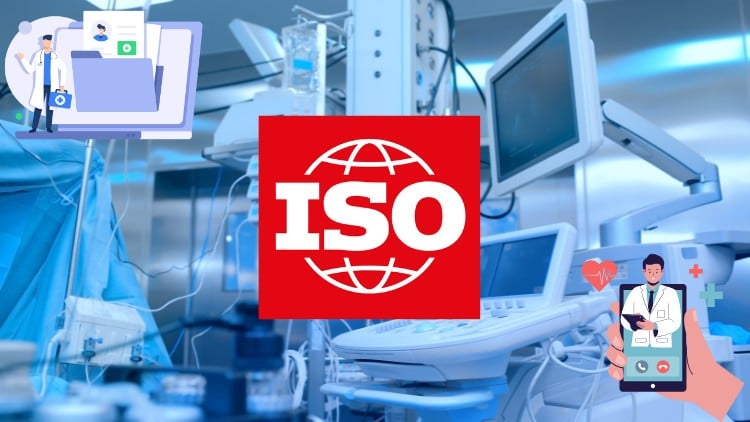
Master ISO 13485 quality assurance standards for medical devices: system design, documentation, audits, and compliance
⏱️ Length: 9.0 total hours
⭐ 3.94/5 rating
👥 2,425 students
🔄 June 2025 update
Add-On Information:
Note➛ Make sure your 𝐔𝐝𝐞𝐦𝐲 cart has only this course you're going to enroll it now, Remove all other courses from the 𝐔𝐝𝐞𝐦𝐲 cart before Enrolling!
- Course Overview
- Explore the global regulatory landscape where ISO 13485 serves as the core quality management standard for medical devices, crucial for patient safety and product efficacy.
- Understand the strategic imperative of integrating a robust Quality Management System (QMS) across the entire product lifecycle, from initial concept to post-market surveillance.
- Grasp the intricate relationship between ISO 13485 and other crucial frameworks like FDA 21 CFR Part 820 and EU MDR/IVDR, positioning it as a key harmonizing standard.
- Delve into the significance of the 2025 updates, reflecting evolving best practices and technological advancements to keep your knowledge current and future-proof.
- Position your organization to confidently navigate complex global regulatory environments, ensuring consistent compliance and facilitating international market access.
- Examine the profound organizational impact of an ISO 13485-driven culture, fostering proactive problem-solving, clear accountability, and quality beyond mere compliance.
- Gain insights into how meticulous quality assurance impacts not just regulatory standing but also brand reputation, customer trust, and long-term business sustainability.
- Requirements / Prerequisites
- No prior deep ISO 13485 expertise is mandatory, but basic familiarity with general quality concepts or experience in any regulated industry will be advantageous.
- A professional interest in the medical device sector, whether in R&D, manufacturing, regulatory affairs, quality assurance, or senior management.
- Basic computer literacy, internet access, and a commitment to actively engage with the course material over approximately 9 hours.
- An eagerness to learn structured quality management principles and apply them to real-world medical device scenarios.
- Skills Covered / Tools Used
- Strategic QMS Development: Master the methodology for designing and implementing a scalable, adaptable QMS that meets ISO 13485 and supports sustained business growth.
- Risk-Based Decision Making: Apply practical tools and frameworks for embedding risk management principles throughout the QMS, aligning with ISO 14971, to proactively identify and control risks.
- Process Optimization & Mapping: Learn to analyze, optimize, and document critical business processes (e.g., design control, production, supplier management) to enhance efficiency and ensure compliance.
- Effective Communication & Training: Develop skills to articulate QMS requirements clearly and conduct impactful training, fostering company-wide understanding of quality responsibilities.
- Supplier Quality Management: Acquire techniques for rigorous selection, evaluation, and monitoring of suppliers to guarantee the quality of outsourced processes and components.
- Post-Market Surveillance Integration: Understand how to seamlessly link QMS processes to post-market activities, including complaint handling and vigilance, for comprehensive product lifecycle management.
- Corrective & Preventive Action (CAPA) Proficiency: Develop systematic approaches to identify root causes of non-conformities and implement effective CAPA, driving continuous improvement.
- Benefits / Outcomes
- Career Acceleration: Elevate your profile as an invaluable expert in medical device quality assurance, opening doors to leadership and specialized roles within the industry.
- Global Market Access: Empower your organization to achieve and maintain critical international certifications, thereby expanding market reach and enhancing competitive advantage.
- Mitigated Regulatory Risks: Implement proactive systems that minimize compliance gaps, significantly reducing the likelihood of adverse regulatory findings, costly recalls, and hefty fines.
- Superior Product Quality: Systematically embed quality assurance into every stage of product development and manufacturing, resulting in safer, more reliable devices and improved patient outcomes.
- Operational Excellence: Streamline internal processes, reduce costly rework, and optimize resource allocation through a meticulously implemented ISO 13485 QMS, driving significant efficiencies.
- Robust Organizational Culture: Cultivate an environment where quality is an inherent shared responsibility, fostering accountability, continuous learning, and a proactive compliance mindset.
- Professional Credibility: Gain a recognized credential demonstrating your specialized knowledge and expertise in medical device quality, boosting your professional confidence and industry standing.
- PROS
- Highly Current Content: Features the essential 2025 updates, ensuring learners are equipped with the absolute latest interpretations and industry best practices.
- Actionable & Practical Focus: Moves beyond theory, providing concrete strategies and methodologies directly applicable to real-world medical device QA challenges.
- Comprehensive Coverage: Delivers a holistic understanding of ISO 13485 across the entire QMS, from foundational principles to advanced implementation techniques.
- Enhanced Employability: Directly boosts professional value and career progression for individuals working in or aspiring to join the dynamic medical device sector.
- Global Compliance Alignment: Prepares individuals and organizations not just for ISO certification, but also for navigating diverse international regulatory landscapes.
- CONS
- Intensive Subject Matter: While comprehensive, fully internalizing and applying the extensive ISO 13485 standard and its practical implications may require dedicated self-study and hands-on experience beyond the stated course duration.
Learning Tracks: English,Business,Industry
Found It Free? Share It Fast!